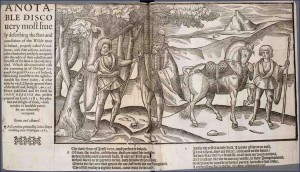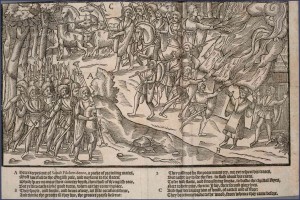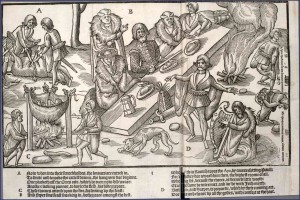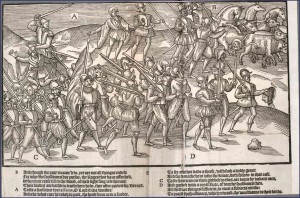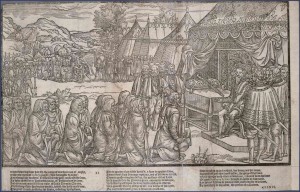Introduction:
John Derrick’s The Image of Irelande (1581) contains some of the earliest post-Reformation representations of Irish culture by an English writer. Written in verse, the work describes the exploits of Sir Henry Sidney, who had been appointed as Lord Deputy of Ireland by Elizabeth I in 1565. During his thirteen years as Lord Deputy, Sidney used scorched earth policies to suppress Irish interests in the midlands, west, and north, and helped put down the foundations for the 16th and 17th century plantations. Derrick’s illustrations and verse depict (in negative and distorted ways) Irish customs and present an idealized view of the perceived benefits of the English conquest.
Source:
Selections from John Derrick, The Image of Irelande (1581)
Full illustrations available at http://www.lib.ed.ac.uk/about/bgallery/Gallery/researchcoll/ireland.html
Caption:
The lively shape of Irish kern, most perfect to behold,
Of man, the master, and the boy, these pictures do unfold;
Wherein is bravely painted forth, a natural Irish grace
Whole like in every point to view, hath seldom stepped in place.
Mark me the kern that grips the axe, fast with his murdering hand,
Then shall you say a righter knave, came never in the land:
As for the rest so trimly dressed, I speak of them no evil,
In each respect, they are defect (as honest as the devil).
As honest as the pope himself, in all their outward actions,
And constant like the wavering wind, in their imaginations,
Which may be proved in sundry parts, hereafter that ensue,
A perfect sign for to define, the above additions true.
Caption:
A) Here creeps out of Saint Filcher’s den, a pack of prowling mates,
Most hurtful to the English Pale, and noisome to the states:
Which spare no more their country birth, then those of the English race,
But yield to each a like good turn, when as they come in place.
B) They spoil, and burn, and bear away, as fit occasions serve,
And think the greater ill they do, the greater praise deserve:
They pass not for the poor man’s cry, nor yet respect his tears,
But rather joy to see the fire, to flash about his ears.
To see both flame, and smoldering smoke, to dark the crystal skies,
Next to their prey, therein I say, their second glory lies.
C) And thus bereaving him of house, of cattle and of store:
They do return back to the wood, from whence they came before.
Caption:
A) Now when into their fenced holds, the knaves are entered in,
To smite and knock the cattle down, the hangmen do begin.
One plucks off the dress coat, which he even now did wear:
Another lacking pans, to boil the flesh, his hide prepare.
C) These thieves attend upon the fire, for serving up the feast:
B) And Friar Smellfeast sneaking in, doth preach amongst the best.
Who plays in Romish toys the ape, by counterfeiting Paul:
For which they do award him then, the highest room of all.
Who being set, because the cheer, is deemed little worth:
Except the same be intermixed and laced with Irish mirth.
D) Both bard, and harper, is prepared, which by their cunning art,
Do busk and cheer up all the guests, with comfort at the heart.
Caption:
B) And though thy prey recovered be, yet not all things ended:
For while the soldiers do pursue, the rogues that have offended.
Who never cease till in the blood, of these light fingered thieves:
Their blades are bathed to teach them hold, they after prowl for beeves.
A) To see a soldier toze a kern, O Lord it is a wonder:
And eke what care he taketh to part, the head from neck a sunder.
To see another lead a thief, with such a lovely grace:
And for to mark how loath the knave, doth follow in that case.
C) To see how trim their glibbed heads, are borne by valiant men,
D) And guarded with a royal sort, of worth soldiers then.
All these are things sufficient, to move a subject’s mind:
To praise the soldiers, which reward, the woodkern in their kind.
Caption:
When flickering fame had filled the ears of martial men of might,
With rare report of Sidney’s praise (that honorable knight).
And though the brute in Irish soil did well confirm the same,
As who could say in England’s claim, of justice there he came,
And to maintain the sacred right, of such a Virgin Queen,
For seeking of her subjects’ wealth, whose like hath never been,
The great O’Neill, to strike the stroke, in sealing up the same,
And to prepare this noble knight, a way to greater fame,
Amazed with such strange reports, and of his own accord,
Came in prostrating him before, the presence of this lord.
With humble suit for prince’s grace, and mercy to obtain,
With like request upon the same, his friendship to attain.
Who promised then by pledge of life, and virtue of his hand,
For ever to her noble grace, a subject true to stand,
And to defend in each respect, her honor and her name,
Against all those that durst deface, the glory of the same.
Which things with other actions more, redound unto the fame
Of good Sir Henry Sidney knight, so called by his name.
Lo, where he sits in honor’s seat, most comely to be seen,
As worthy there to represent, the person of a Queen.
